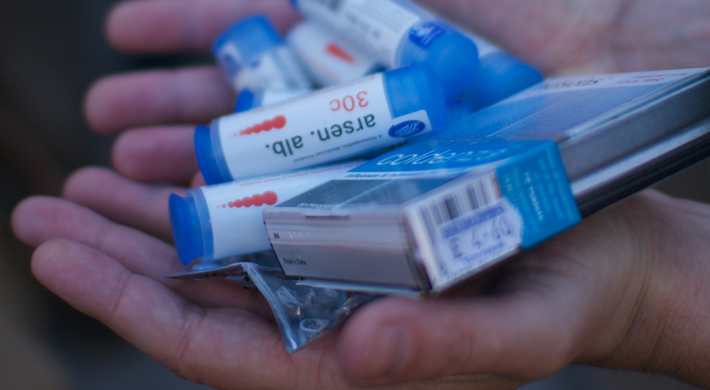
With the growth of integrative health at Canadian universities ”” a trend that has been called quackademics ”” it seems likely that we will see more and more clinical trials exploring the efficacy of questionable alternative therapies. Indeed, there are currently ongoing university-based clinical trials that investigate some of the most scientifically preposterous forms of alternative medicine, such as homeopathy and Reiki.
Scientific credibility aside, is it ethically acceptable to do this kind of work at institutions that are required to follow internationally recognized research ethics standards?
Before proceeding with a consideration of this issue, allow me to briefly review why homeopathy is so scientifically absurd. (And, by the way, a similar science-based skewering could be done for other alternative practices, such as the so-called ”œlife force energy” therapies like Reiki.)
First, homeopathy is based on the principle of like cures like. The idea is that consuming a particular ”œactive” ingredient ”” a plant, mineral or even snake venom”ˆ”” that induces a similar reaction to the ailment you are trying to treat will fire up your body’s natural healing process (whatever that means). So, for example, consumption of a beetle extract that causes urinary tract problems in a healthy person can, or so the theory goes, be used to help treat an individual with a UTI.
Unfortunately for the advocates of homeopathy, there is absolutely no evidence to support the like cures like theory or that any of the flowers, animals, minerals, etc., can produce the desired biological response. (Note: This is not the same process as vaccination, which uses biologically relevant and active ingredients to trigger an actual immune response.)
Second, a homeopathic solution is ultra diluted. This does not mean that there are only very small bits of the alleged active ingredient present. A homeopathic solution is so diluted that the active ingredient is no longer present in any true physical sense. It is diluted into near nonexistence. Indeed, homeopaths believe ”” contrary to the known laws of physics and chemistry ”” that the more diluted a solution, the more powerful it is. For most homeopathic solutions there is no active ingredient present. Zero. Zilch. It is basically water.
The proponents of homeopathy suggest that the water holds the memory of the therapeutic ingredient. How water molecules could do this has never been explained, and there is no replicated research to support the idea. Some homeopaths try to roll out explanations based on quantum physics. But, of course, this is nothing but pseudoscientific hand-waving. Homeopaths can’t even explain why the electromagnetic forces of the water molecules selectively retain the memory of the allegedly therapeutic ingredient, as opposed to all the other things the water has been exposed to during its watery history ”” such as fish poop, bottom sludge and the bottle used to make the homeopathic solution.
Homeopathy isn’t like other alternative therapies and practices that may warrant further scientific investigation because there is a potentially useful active ingredient, as in the context of some herbal remedies. To believe homeopathy works ”” or, even, could work ”” beyond the placebo effect (which is, I admit, a powerful force) is to believe in magic.
So, why might clinical research ”” that is, research involving patients ”” exploring the magical properties of homeopathy be unethical?
The Declaration of Helsinki, a document that has helped to set international norms for research ethics, states that ”œ[m]edical research involving human subjects must conform to generally accepted scientific principles [and] be based on a thorough knowledge of the scientific literature” (para B12). Similarly, the National Institutes of Health (NIH) requires that clinical trials be scientifically valid and have a clear scientific objective that utilizes accepted principles. Clearly, research on a topic like homeopathy, which conflicts with many accepted scientific principles, does not comply with these ethical requirements.
Why is this a problem, ethically speaking? As nicely summarized by the NIH, scientifically invalid research is ”œunethical because it is a waste of resources and exposes people to risk for no purpose.”
While the harm associated with participation in a homeopathic trial may seem trivial ”” it is, after all, water ”” the participants’ time and trust are still required. For the privilege of being allowed to recruit patients for a clinical trial, investigators have the responsibility, as noted in Canada’s Tri-Council Policy Statement on Research Ethics, ”œto ensure that research involving humans meets high scientific and ethical standards.” Does a trial on homeopathy meet these basic standards? Nope.
Supporters of homeopathy will undoubtedly argue that patients should have the option to choose to be involved in homeopathic research. Assuming it is okay for a university that is bound by existing research ethics norms to allow patients to sign up for scientifically questionable research (a contestable assumption), the participants would have to be fully informed. The consent process for a homeopathic clinic study should include an honest and”ˆ”” I would argue ”” science-based disclosure of what the current literature says about the therapy under investigation (homeopathy is scientifically impossible and doesn’t work), the potential risks (it is water, so the physical risks are small), and potential benefits (none, at least beyond a placebo effect). Anything less than this kind of frank assessment ”” which, I speculate, seems unlikely to be the norm in this context ”” would fall short of an adequate disclosure and would not respect the research participant’s autonomy.
Of course, there are many other ethical issues associated with this type of research. For example, is it appropriate to use university and public resources to research the effectiveness of magic? If regulated professionals are involved, such as physicians, does the research accord with existing legal and professional norms that require adherence to a science-based approach? And, perhaps most worrisome, when a publicly funded university is involved in the research, it seems likely that it will help to legitimize the pseudoscientific underpinnings of the practice, thus facilitating the marketing of homeopathic products.
Indeed, the Canadian College of Homeopathic Medicine has proudly highlighted the homeopathic research done at Canadian universities. The work is also noted on the websites of entities marketing homeopathic remedies, private homeopathic clinics and homeopath advocacy groups. This kind of implicit university endorsement also seems likely to make the use of particularly problematic homeopathic products, such as homeopathic alternatives to vaccination and cancer treatment, appear, from the perspective of the general public, to be a more reasonable and scientifically plausible option. For example, one website that has a glowing review of university-based homeopathic research also has a series educating parents on how to avoid vaccinating their kids.
Advocates of homeopathy research often point to studies”ˆ”” usually methodologically weak ”” that show a small beneficial effect. But given that homeopathy has the same scientific plausibility as using Harry Potter’s wand to treat illness, any study that shows a treatment effect is more a statement on the challenges of doing clinical research than proof of clinical benefit.
Despite the scientific absurdity of homeopathy, its popularity seems to be growing. This is certainly a cultural phenomenon worth studying. But submitting homeopathy to clinical research strains existing research ethics norms and will only give it undeserved credibility. Please stop.








